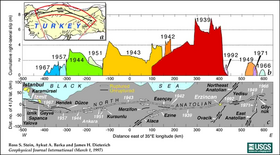North Anatolian Fault


The North Anatolian Fault (NAF) (Template:Lang-tr) is a major active right lateral-moving strike-slip fault in northern Anatolia which runs along the transform boundary between the Eurasian Plate and the Anatolian Plate. The fault extends westward from a junction with the East Anatolian Fault at the Karliova Triple Junction in eastern Turkey, across northern Turkey and into the Aegean Sea. It runs about 20 km south of Istanbul.
Significant earthquakes
Since the disastrous 1939 Erzincan earthquake, there have been seven earthquakes measuring over 7.0 on the Richter scale, each happening at a point progressively further west. Seismologists studying this pattern believe that earthquakes happen in "storms" over a number of decades and that one earthquake triggers the next. By analysing the stresses caused along the fault by each earthquake, they were able to forecast the shock that hit the town of İzmit with devastating effect in August 1999. It is thought that the chain is not complete, and that an earthquake will soon strike further west along the fault – perhaps in the heavily populated city of Istanbul.
| Event | Moment magnitude | Casualties |
|---|---|---|
| 1939 Erzincan | 7.9 | 32,962 dead |
| 1942 Niksar-Erbaa | 6.9 | |
| 1943 Tosya-Ladik | 7.7 | |
| 1944 Bolu-Gerede | 7.5 | |
| 1949 Karlıova | 7.1 | |
| 1951 Kurşunlu | 6.9 | 50 dead, 3,354 injured |
| 1957 Abant | 6.8 | |
| 1966 Varto | 6.9 | 2,394 dead, 1,489 injured |
| 1967 Mudurnu Valley | 7.1 | 86 dead, 332 injured |
| 1992 Erzincan | 6.5 | |
| 1999 İzmit | 7.4 | 17,480 dead and 43,959 injured |
| 1999 Düzce | 7.2 | 894 dead |
